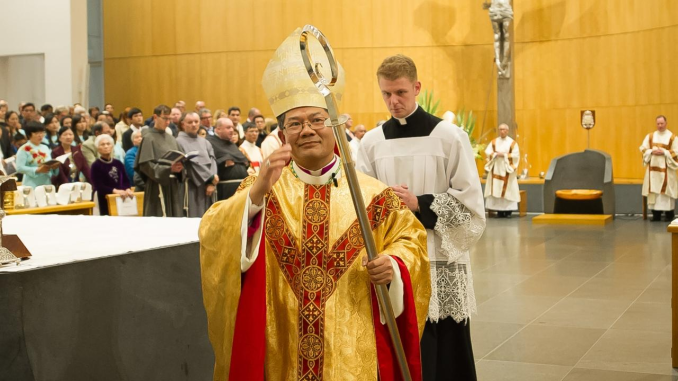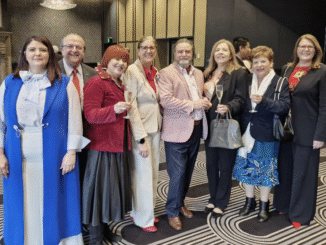
In the heart of Sydney’s western suburbs, the Catholic faithful find themselves in a state of perplexity as the hierarchy grapples with divisions arising from a recent letter issued by Bishop Vincent Long OFM of Parramatta in support of the forthcoming Indigenous Voice referendum scheduled for 14th October 2023.
Known for his progressive viewpoints, including his controversial support for the legalisation of same-sex marriage in 2017 and the failed Religious Education Curriculum ‘Living Life to the Full‘ in 2021, Bishop Long, the leader of one of the most culturally diverse dioceses in the country, has again drawn criticism for taking a path on the referendum that diverges from the collective stance of the Australian Catholic Bishops’ Conference (ACBC), the apex body of Catholic Bishops in the nation.
The referendum seeks public approval for the establishment of an Aboriginal and Torres Strait Islander Voice to Parliament. While Bishop Long’s position in favour of the constitutional change has been lauded by some in the secular media it has also raised eyebrows among those who believe the bishop’s unilateral championing of the “YES” is in clear contradiction to the ACBC’s call for “productive debate, mutual respect, and acknowledgment of differing concerns and perspectives” on this matter.
In his letter, Bishop Long unequivocally endorsed a “YES” vote in the referendum, asserting that it signifies a crucial step towards a brighter future for Australia. He likened this historic vote to the 1967 referendum, which recognised First Nations People as integral to the Australian population. Bishop Long’s letter acknowledged the unique position held by First Nations People. Speaking of the confronting historical injustices that have plagued Aboriginal Australians, Long condemned what he believed to be the Church’s “complicity” in failing to “redress the near destruction of our First People’s ancient spirituality and culture.”
Long’s letter cited the words of Pope St John Paul II, who during his 1986 apostolic visit reminded the Church in Australia that it cannot fully embody Jesus’ vision “until the Aboriginal people, have made their contribution to her life and until that contribution has been joyfully received by others”. Long also contends that Australia cannot mature as a nation until it enshrines, celebrates, and strengthens the unique place of its Indigenous brothers and sisters.
However, the Bishop’s outspoken support for the Voice Referendum has not been universally embraced. Steven Gibbs, a catholic parishioner in the Diocese of Parramatta, has expressed concerns about Bishop Long’s divergence from the ACBC’s unified position, respectful of many different views among the Catholics in Australia.
“How can we, as faithful Catholics, trust the ongoing synodality process in both Rome and our own Diocese of Parramatta when our Bishop is the first to defy the common position adopted by the ACBC? The pro-YES statement only leads to confusion and ambiguity for the faithful. This, in my view, is hypocrisy and clericalism at its worst,” noted Gibbs.
Meanwhile, given the large number of eastern-rite Catholics living within the boundaries of the Parramatta Diocese, the Maronite Bishop of Australia, Antoine-Charbel Tarabay has issued his own Pastoral Message, calling for unity irrespective of their views on the referendum.
In his message, Bishop Tarabay reminded all believers about the complexity of the referendum question and urged open and respectful dialogue in line with the recommendations issued by the ACBC. Tarabay noted that the Maronite Church has adhered by the official neutral stance collegially decided by the Catholic Bishops at a national level, refraining from offering guidance on whether to vote “YES” or “NO.” The Bishop encouraged community members to become well-informed and to discern their own vote before casting it.
Tony Khoury, a devoted Maronite church-goer at Our Lady of Lebanon Co-Cathedral in Harris Park, expressed his gratitude to Bishop Tarabay for providing clarity on the Maronite Church’s position. “Christians are people of dialogue, discernment and prayer, not political activism. During the same-sex marriage plebiscite, Bishop Tarabay intervened with a letter to reassure the maronites of Sydney and Australia on the teachings of the Church against Bishop Long’s ambiguous statements. Once again, the Maronite hierarchy seems to be left with the task of cleaning up Bishop Long’s mess in Western Sydney,” said Khoury.
As the referendum date approaches, the Catholic community in Sydney’s western suburbs remains divided. The ongoing debate serves as a reminder of the intricate and evolving nature of the Catholic Church’s engagement with contemporary societal and political issues. In this polarised landscape, the faithful must navigate their own convictions in light of the Church’s teachings, while seeking unity and putting aside the divisive views of part of its leadership.




Be the first to comment